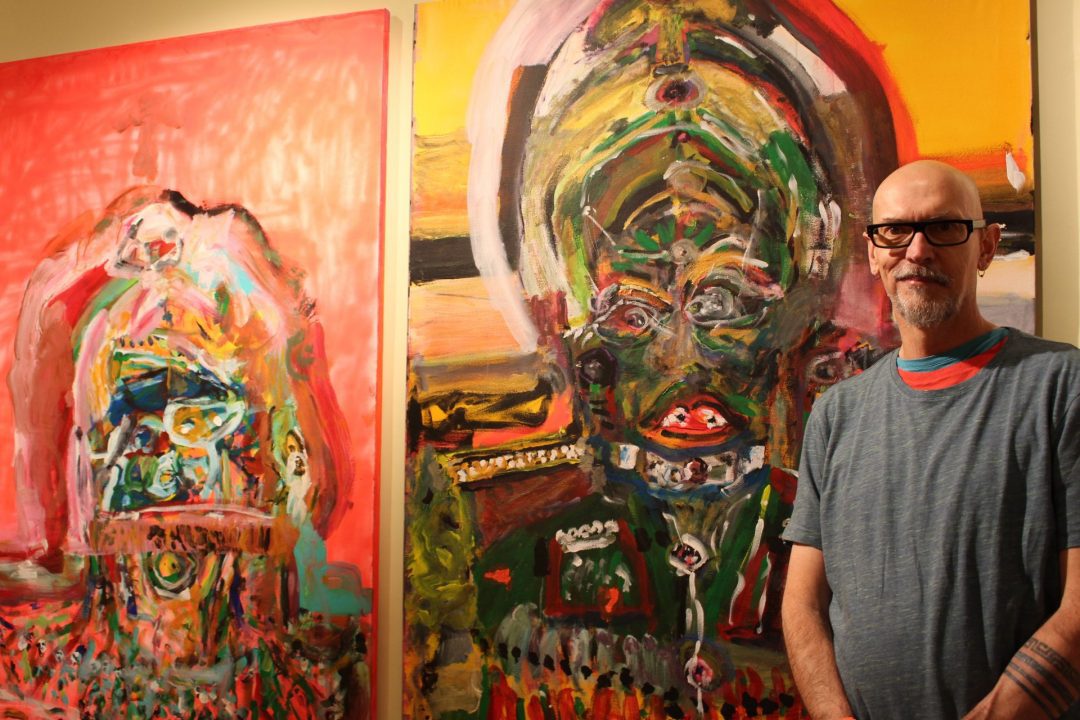Short flashes of light enter the corners of your eyes. Then large crowds of people are in your bedroom. But you can’t touch anything. There are no lights and the people are not real.
These are just some of the hallucinations Kevin Whitaker, 61, sees as a result of his Parkinson’s disease.
“It’s a bit scary because it happens without you even thinking about it,” Whitaker said.
A former Ontario Superior Court judge and now a painter for Parkinson’s research, Whitaker has been using art as a way to express the monsters inside his head.
His exhibit, Chasing Monsters, has been extended. It will run Saturday and Sunday, April 21-22, 1 p.m. to 4 p.m., and Saturday and Sunday, April 28-29, 1 p.m. to 4 p.m., at Back Lane Studios at 9 Neepawa Ave.
Whitaker grew up near Danforth and Coxwell avenues before eventually attending law school at York University where he met his future wife, Marie Moliner.
Whitaker was appointed to a judgeship in 2012. He started visiting a doctor in his mid-50s when he noticed he wasn’t thinking properly.
“The doctor said he had CRAFT disease,” Moliner said. “Can’t Remember A Freaking Thing!”
Whitaker knew it was more than that and, after some persistence, he was diagnosed with Parkinson’s disease about four years ago.
“They say once you’ve been diagnosed, you’ve probably had it for 10 years,” Moliner said.
Then doctors diagnosed him with Lewy Body Dementias (LBD), a more aggressive and degenerative form of Parkinson’s that affects Whitaker’s cognitive function and physical ability.
He stepped down as a judge in 2016.
“It’s been very difficult because, when you don’t know what’s wrong, the uncertainty is almost worse than actually knowing,” Moliner said.
Whitaker takes dopamine medication, without which his brain would eat his protein deposits and he wouldn’t be able to think properly or move.
“As long as I stick to the dopamine schedule of two to three hours on and off, it’s possible to have a reasonably [normal] way of doing things,” Whitaker said.
His wife administers his dopamine medication.
“The dopamine releases pleasure to his brain that allows him to be more limber in the same way people get in their art practices,” Moliner said.
His first art teacher in middle school, the former Toronto city councillor Howard Moscoe, had said to him, “I will pass you if you promise not to be an artist.”
Moliner observed three symbolic periods of time in Whitaker’s life when he painted.
The first was about 20 years ago when his father became sick and was hospitalized for “ulcered pancreatic alcohol-induced illness,” Moliner said.
The thought of his father possibly dying triggered a need to paint his frustration and devastation.
His father stopped drinking and became healthier, which paused his artistic endeavours for some time.
Whitaker’s next period of painting resumed in the early 2000s when he became chair of the Ontario Labour Relations Board.
He painted That Chair anticipating the complexity of the job in 2002, Moliner said. It’s her favourite piece by Whitaker.
Fast-forward to over a decade later, and he is back to painting regularly as a way of dealing with the emotions and hallucinations from LBD.
“I feel like I am continually thinking about how I can change and remodel my work,” Whitaker said. “I could do two or three paintings at the same time, so when I get thoughts I can fool around with it here or there.”
Whitaker’s favourite painting, The Dictator, was finished in three days, save for some minor touches.
His wife bought him the large canvas for Valentine’s Day this year; they took it with them on vacation to California.
Painting always had a special role in Whitaker’s life, and painting with Parkinson’s disease helps him to calm the monsters in his head.
He will donate all proceeds from his first art exhibition to Parkinson’s research.
“I think moving forward my life will revolve around deepening my relationships with my family, friends and colleagues in the court,” said Whitaker, who is expected to live for five more years.
“Parkinson’s is not a death sentence,” he said. “Even though there is an inevitability to having Parkinson’s disease, your life does not become meaningless.”


















